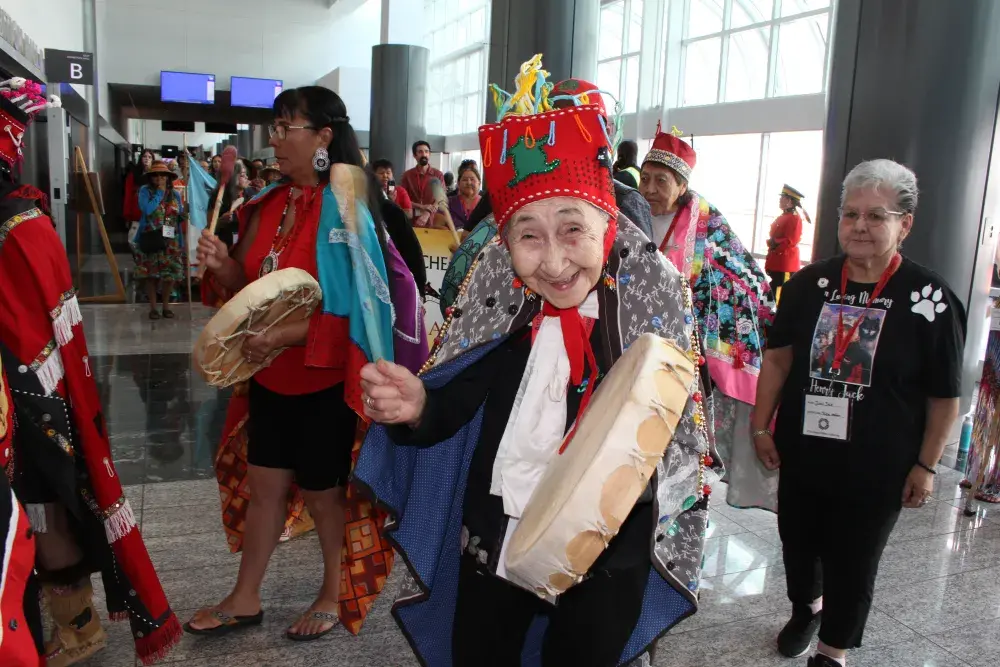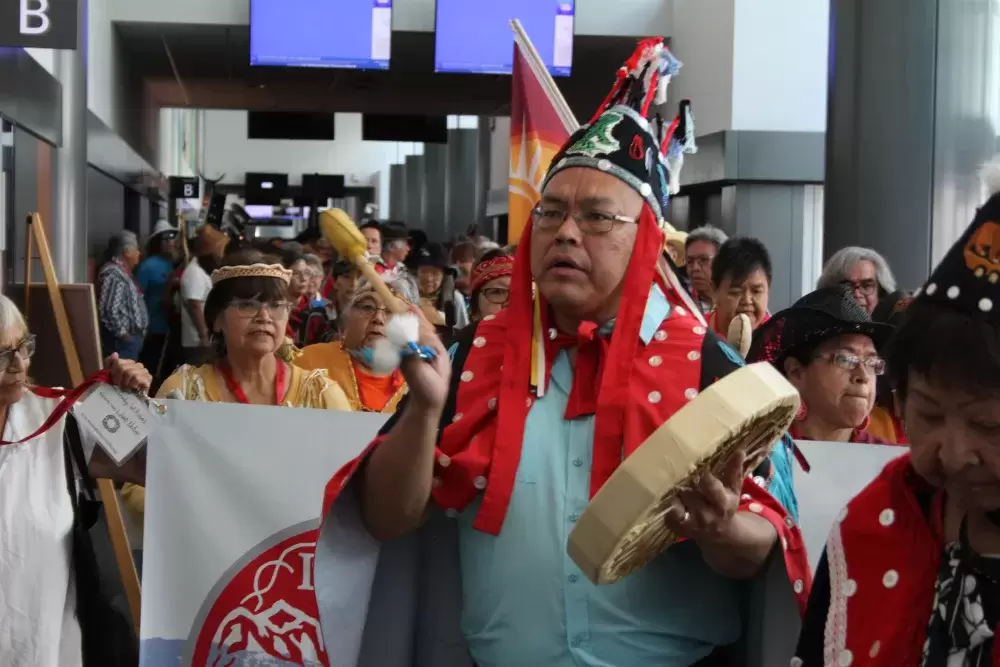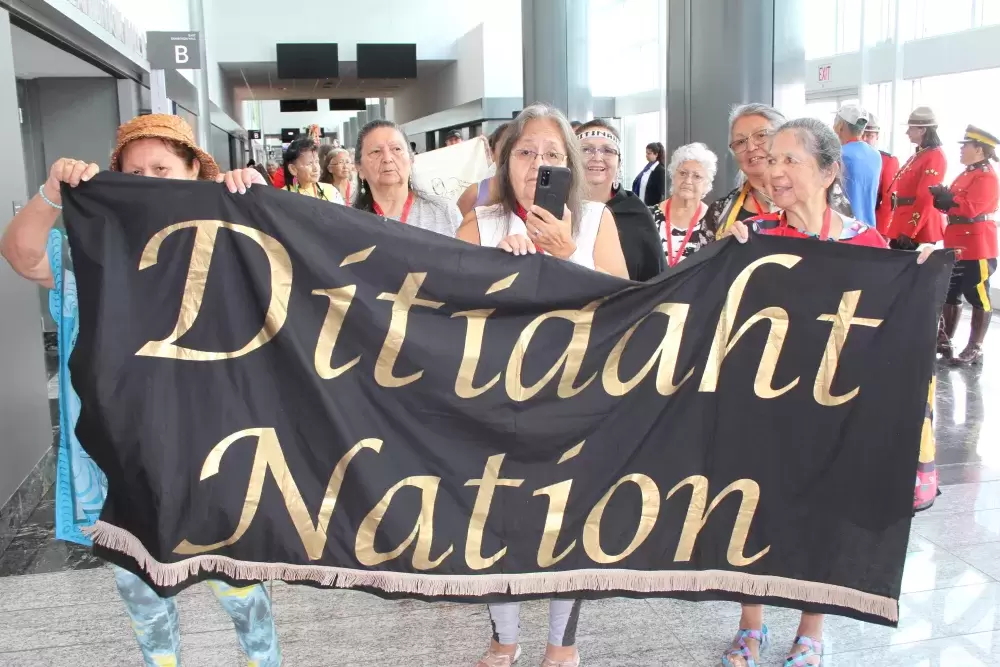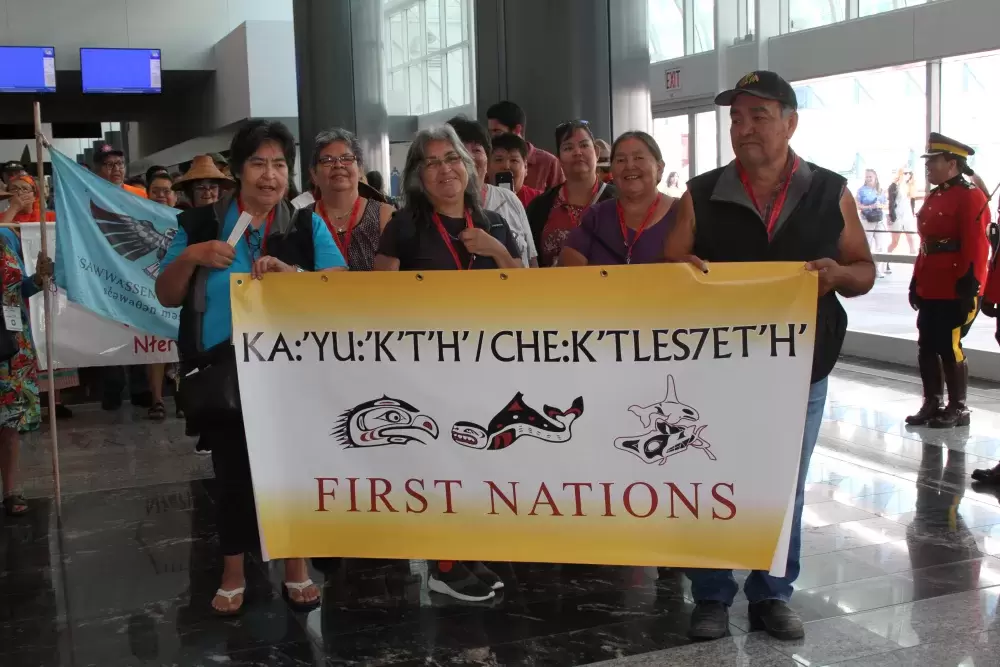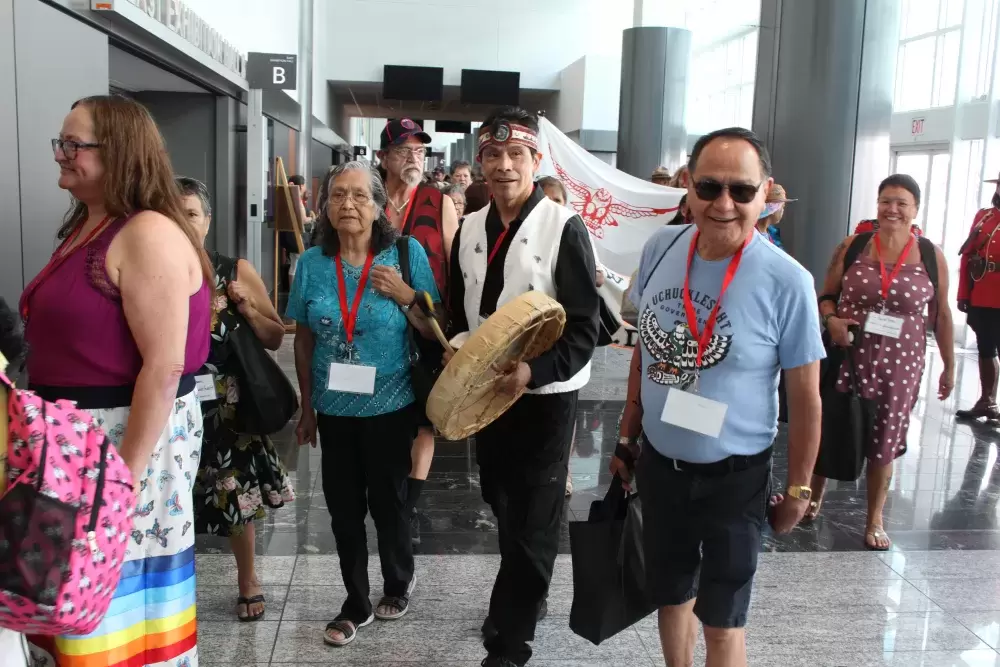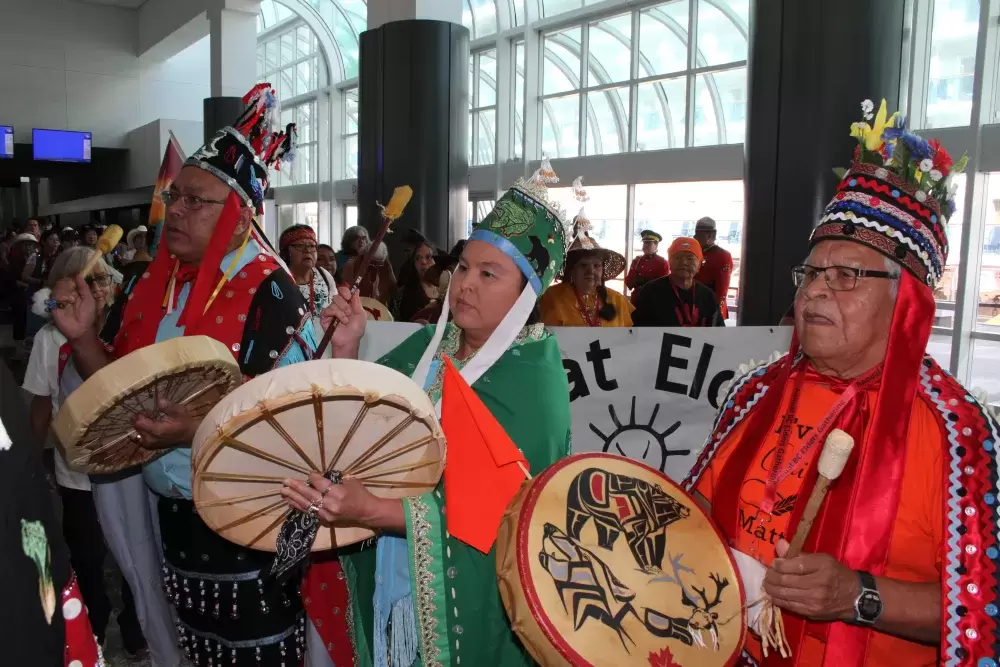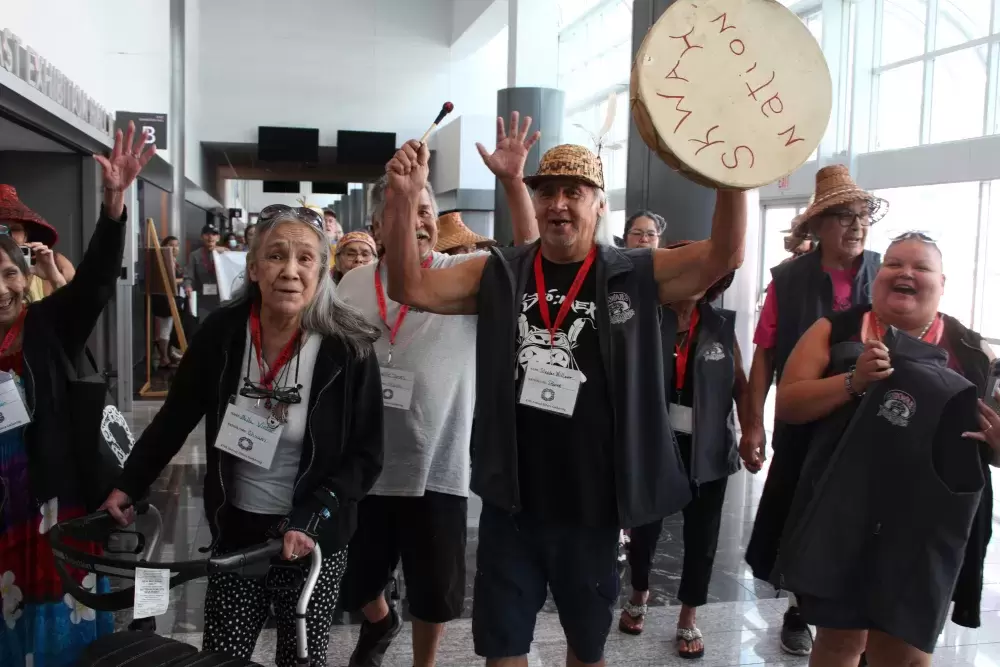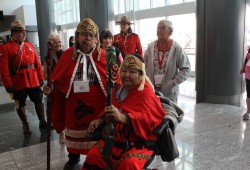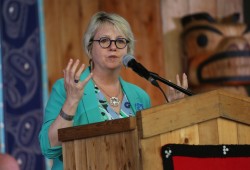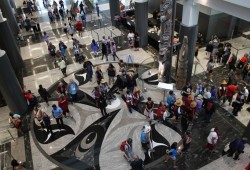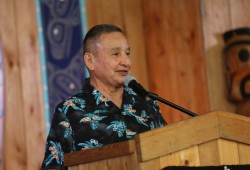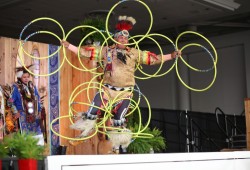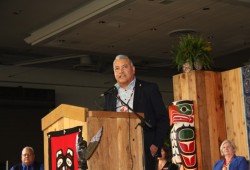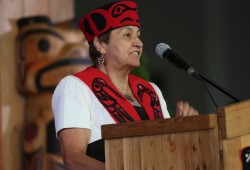For the first time in four years, elders from First Nations across British Columbia converged for two days celebrating the role they hold in their respective communities.
The BC Elders Gathering opened Aug. 15 at the Vancouver Convention Centre, bringing together nearly 1,800 elders and their helpers to an annual event that has been sidelined due to the COVID-19 pandemic. The last Elders Gathering was at the city’s convention centre in 2019, attracting a similar number of participants.
This year’s event brought groups from several Nuu-chah-nulth nations, including Ehattesaht, Nuchatlaht, Uchucklesaht, Ditidaht and Ka:'yu:'k't'h'/Che:k'tles7et'h'.
For the nearly two dozen Ka:'yu:'k't'h'/Che:k'tles7et'h' members at the gathering, it took a full day of travel to make it to the downtown Vancouver venue. Approximately half came from the First Nation’s village of Houpsitas in remote Kyuquot on northwest Vancouver Island, while others ventured from Campbell River, Nanaimo and Victoria, said Tess Smith. The group booked their hotel a year ahead.
“We left home at 8 a.m., and we arrived here at 11:30 p.m.,” said Smith. “We’re all thankful that our nation helped us get here.”
This is the 47th annual Elders Gathering, and Smith recalls accompanying her mother to the event, long before she became an elder.
“Then I got older, became one of them,” she said.
Dorothy Shepherd was among the 15 who travelled with the Ditidaht First Nation, many coming from their home reserve on Nitinaht Lake. Shepherd was invited by the First Nation to take part in the trip.
“They called us and asked us if we wanted to go. Why not?” she said, adding that she appreciates meeting with elders from other First Nations. “We learn from each other.”
“We borrowed the nation’s school bus,” said Melody Thomas of the Ditidaht group, noting that it’s important for the First Nation to “keep all of our elders together, cherish them, honour them.”
“To me, it’s to live, laugh, love, teach, and understand we’re family,” said Archie Little, who came with a Nuchatlaht group of seven. “We need to keep passing the teaching on.”
‘An important institution that we need to promote’
Since 1982 the BC Elders Gathering has had a king and queen each year, and after the procession of elders into the main auditorium the 2023 event began with an address by this year’s matriarchs Mary and William Lawley of the Lake Babine Nation.
Provincial Health Officer Dr. Bonnie Henry also spoke to the crowd on the first morning, addressing “Indigenous specific racism” in B.C.’s health care system. She noted the difficulties from the COVID-19 pandemic’s social distancing and restrictions on gathering.
“Take joy in the faces that you see, and being together again,” said Henry. “I hope that this is good and healing medicine for all of you.”
The newly elected MLA Joan Phillip of the Penticton Indian Band spoke, who won a by-election in June for the Vancouver-Mount Pleasant riding, followed by her husband Grand Chief Stewart Phillip of the BC Union of Indian Chiefs.
“We all know we’re going from crisis after crisis,” he said, referencing the pandemic as well as displacement from flooding and wildfires in recent years.
“We’ve been forced into 50-year-old motels, yet we’ve prevailed because of our elders,” said Phillip. “In every community, the elders are the strength, the elders have the wisdom, the elders have the experience, and that’s why you’re the first people we go to and ask, ‘What are we going to do?’.”
Phillip stressed that the BC Elders Gathering “is an important institution that we need to promote”, pointing to First Nation governments, tribal councils and provincial organizations to help the event continue.
Fundraising, grants needed to cover registration fees
Until late January it was uncertain if this year’s event would take place, as its host organization, the BC Elders Communications Center Society, was unsure if enough groups would register to cover the gathering’s $1 million cost. Registration fees have gone up since they were introduced in 2007, increasing from $400 per person in 2019 to $550 this year, due to the inflationary costs of renting the downtown Vancouver venue, which is served by unionized caterers.
This year snacks were not expected to be included due to the additional cost. Although outside food isn’t permitted in the Vancouver Convention Centre, the organizing society encouraged groups to have extra food nearby for their elders. But by the time the event was held, organizers managed to find $50,000 to provide snacks and coffee for participants, according to the BC Elders Communications Center Society.
As the Nuchatlaht have less than 170 members, Archie Little said the First Nation relied on grants to attend this year’s gathering.
“Normally we couldn’t do it on our own,” he said. “That’s a little costly.”
Edgar Smith said that the Nuchatlaht had been preparing for a whole year to send people to the Elders Gathering.
“We’re a small nation, so we have to look way ahead just in order to afford for a few of our people to go,” he said.
“It’s fairly expensive in the area where it’s at,” said Ahousaht member Wally Samuel.
As part of a group tied to the BC Association of Aboriginal Friendship Centres, Wally and his wife Donna were able to attend this year’s gathering, one of at least 10 the couple have gone to over the years.
“It’s a social activity, you get to meet with family and friends,” said Wally. “You meet somebody new all the time and reconnect with friends.”
In the past, smaller communities have often hosted the Elders Gathering. But with 23 years of service to the event, BC Elders Communications Center Society currently stands as the default bidder if no other community steps forward to hold the event. The gathering also defaults to the society if a bidder is deemed not large enough to host.
“If we are called upon to be the host again for 2024, or future years, we want everyone to know ahead of time that it will be held in this lower mainland location again,” wrote BCECCS Coordinator Donna Stirling in the society’s Elders Voice newsletter.
The society hosted gatherings in Campbell River in 2000 and 2017, but this is no longer possible, noted Sterling.
“Campbell River no longer has a caterer large enough to handle the needs of such a large event and serve the elders’ needs properly so it will not be back there,” she wrote. “The elders have been more excited about this location than any others in many, many years and even though it costs more to stay in the Lower Mainland, I would like to ask you to discuss the possibility with your elders of going to the VCC again after you have all had a chance to evaluate the experience.”
Two gatherings were hosted in Port Alberni
The Elders Gathering has been hosted in Nuu-chah-nulth territory twice, both times in Port Alberni. For the 12th annual event the Port Alberni Friendship Center hosted in 1988, drawing 241 elders from across the province. Then the Nuu-chah-nulth Tribal Council and Tseshaht First Nation took on the gathering in 2006, bringing together nearly 5,000 elders and helpers for three days.
With no registration fees, lead organizer Vina Robinson said that approximately $500,000 was fundraised for the event, which used the Alberni Valley Multiplex arena as its main venue, with meals served in the next-door Athletic Hall and workshops at North Island College’s nearby campus.
“It was absolutely amazing,” said Robinson. “Two of the nations hosted two of the meals, so that really helped out.”
A team of 24 people with designated roles began coordinating the gathering in late January, ahead of its opening on July 18.
“Matilda Atleo looked after all the catering,” said Robinson. “She went and did all the rentals in Vancouver, rented the big food trucks, freezer trucks.”
By the time elders arrived, dozens of golf carts were transporting people between venues. The event relied on hotels in other towns, as Port Alberni’s accommodation quickly filled up.
“We didn’t have anywhere near enough room,” recalled Robinson. “We bussed people to Parksville and Nanaimo.”
It’s a benefit to the event when a smaller community steps forward, noted Robinson, as a large city like Vancouver brings challenges that go beyond cost.
“If you host an elders gathering in Vancouver, it’s going to cost you an arm and a leg. You cannot park anywhere free,” she said. “In a smaller community you’re going to have people that want to come forward and help, whereas if you’re in Vancouver, it’s a large city and trying to gather people is a lot harder than if you were in a smaller city like Port Alberni. It was so easy for me to form a committee of 24, everybody wanted to help.”
Little would like to see more smaller communities step forward in the future, even if it involves travelling further inland.
“What I’d like to see is have it more local. There might be young people, so that they can see and learn and understand what we’re trying to pass down,” he said. “We could go support them, we could learn from them, we could see their history, and we’ll probably learn we’re related somehow, even if it’s through family, song, culture.”

